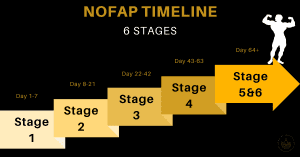Have you ever found yourself compulsively masturbating, even when you know it’s not in your best interest? Maybe you’ve tried to stop, but no matter what you do, you can’t seem to break the cycle. If this sounds familiar, you’re not alone. In fact, there’s a shocking reason why you can’t stop masturbating – and it has nothing to do with a lack of willpower. But don’t worry, there is hope. By understanding the root cause of your behavior and implementing a few key strategies, you can break free from the cycle of compulsive masturbation for good. Keep reading to discover how.
The Shocking Reason Why You Can’t Stop Masturbating – And How to Break Free!
Introduction
Masturbation is a common sexual activity, but it can become a compulsive behavior that affects your daily life and relationships. If you’re struggling to stop masturbating, you’re not alone. The reasons why people can’t stop vary, but there is a common underlying cause that few people talk about.
The Dark Side of Masturbation
Masturbation can be a healthy way to explore your sexuality and relieve stress, but it can also become a dark obsession that takes over your life. When masturbation becomes a compulsive behavior, it can affect your self-esteem, relationships, and even your physical health.
The Hidden Reason Why You Can’t Stop
The reason why people can’t stop masturbating is often rooted in childhood trauma or abuse. Masturbation becomes a coping mechanism to deal with difficult emotions and past trauma. It becomes a way of numbing the pain or escaping from reality.
The Impact on Your Life
Compulsive masturbation can have a significant impact on your life. It can lead to feelings of shame, guilt, and isolation. It can affect your ability to form healthy relationships and even your ability to function at work or school. It can also lead to physical problems such as erectile dysfunction or premature ejaculation.
Breaking the Cycle
Breaking the cycle of compulsive masturbation is not easy, but it is possible. The first step is to acknowledge that you have a problem and seek help. There are many resources available, including therapy, support groups, and self-help books.
Therapy
Therapy can be an effective way to address the underlying issues that are driving your compulsive behavior. A therapist can help you identify the triggers that lead to masturbation and develop healthy coping mechanisms. They can also help you work through past trauma and develop a healthier sense of self.
Support Groups
Support groups can provide a sense of community and understanding. They allow you to connect with others who are struggling with similar issues and provide a safe space to share your experiences. Support groups can be found online or in-person.
Self-Help Books
Self-help books can be a useful tool in breaking the cycle of compulsive masturbation. They can provide practical advice, strategies, and techniques for managing your behavior and addressing the underlying issues. They can also help you develop a healthier mindset and improve your self-esteem.
The Importance of Self-Care
Self-care is an essential part of breaking the cycle of compulsive masturbation. It involves taking care of your physical, emotional, and mental health. This includes getting enough sleep, eating a healthy diet, exercising regularly, and engaging in activities that bring you joy.
The Benefits of Breaking the Cycle
Breaking the cycle of compulsive masturbation can have numerous benefits. It can lead to improved self-esteem, healthier relationships, and better overall health. It can also help you develop a more positive outlook on life and a greater sense of purpose.
Conclusion
Masturbation can become a compulsive behavior that affects your daily life and relationships. The reasons why people can’t stop vary, but there is a common underlying cause that few people talk about. Childhood trauma or abuse can lead to compulsive masturbation as a coping mechanism. Breaking the cycle is not easy, but it is possible. Seeking help from therapy, support groups, and self-help books can be effective in addressing the underlying issues and developing healthy coping mechanisms. Self-care is also essential in breaking the cycle and improving overall health and well-being.
The Role of Mindfulness
Mindfulness can be a powerful tool in breaking the cycle of compulsive behavior. It involves being fully present and aware of your thoughts, feelings, and behaviors without judgment. By practicing mindfulness, you can learn to recognize the triggers that lead to compulsive behavior and develop healthier coping mechanisms.
The Importance of Accountability
Accountability is an important aspect of breaking the cycle of compulsive behavior. It involves taking responsibility for your actions and seeking support from others. This can include sharing your struggles with a trusted friend or family member, joining a support group, or working with a therapist who can hold you accountable.
The Role of Self-Compassion
Self-compassion is an important aspect of overcoming compulsive behavior. It involves treating yourself with kindness, understanding, and empathy. By practicing self-compassion, you can learn to forgive yourself for past mistakes and develop a more positive self-image.
The Importance of Healthy Relationships
Developing healthy relationships is an important part of breaking the cycle of compulsive behavior. It involves surrounding yourself with supportive, positive people who encourage and inspire you. By building healthy relationships, you can develop a stronger sense of self and improve your overall well-being.
The Role of Exercise and Physical Activity
Physical activity can be an effective way to manage stress and improve your overall well-being. By engaging in regular exercise, you can boost your mood, increase your energy levels, and reduce feelings of anxiety and depression. Exercise can also be a healthy way to cope with difficult emotions and reduce the urge to engage in compulsive behavior.
The Importance of Patience and Persistence
Breaking the cycle of compulsive behavior takes time, patience, and persistence. It involves making a commitment to change and staying the course even when faced with setbacks and challenges. By staying focused and committed, you can overcome compulsive behavior and develop a healthier, more fulfilling life.
The Bottom Line
Compulsive masturbation can have a significant impact on your life and relationships. However, it is possible to break the cycle and develop healthier coping mechanisms. By seeking help from therapy, support groups, and self-help resources, practicing mindfulness, developing healthy relationships, engaging in physical activity, and being patient and persistent, you can overcome compulsive behavior and achieve a more fulfilling life.
Frequently Asked Questions
The Shocking Reason Why You Can’t Stop Masturbating – And How to Break Free!
What is the reason why I can’t stop masturbating?
It’s important to understand that masturbation is a natural and healthy activity, but when it becomes an addiction, it can have negative effects on your mental and physical health. The reason why you can’t stop may be related to a variety of factors such as stress, anxiety, boredom, and even hormonal imbalances. It is important to identify the underlying cause of your addiction and address it accordingly.
Can masturbation addiction be treated?
Yes, masturbation addiction can be treated. The first step is to recognize that you have an addiction and seek professional help. A therapist can help you identify the root cause of your addiction and teach you healthy coping mechanisms. There are also support groups that can provide you with a safe space to share your experiences and receive guidance from others who are going through similar situations.
How can I break free from masturbation addiction?
Breaking free from masturbation addiction requires a combination of self-discipline, healthy coping mechanisms, and professional help. Here are a few tips that can help:
– Identify the triggers that lead to your masturbation addiction and avoid them as much as possible.
– Develop healthy coping mechanisms such as exercise, meditation, and journaling.
– Seek professional help from a therapist or support group.
– Surround yourself with supportive and understanding people who can help you stay accountable.
Key Takeaways
– Masturbation addiction is a real and serious issue that can have negative effects on your mental and physical health.
– The root cause of your addiction may be related to stress, anxiety, boredom, and hormonal imbalances.
– Masturbation addiction can be treated with a combination of self-discipline, healthy coping mechanisms, and professional help.
– Identifying your triggers, developing healthy coping mechanisms, seeking professional help, and surrounding yourself with supportive people can help you break free from masturbation addiction.
In conclusion, masturbation addiction is a serious issue that affects many people. The key to breaking free from this addiction is to recognize that you have a problem and seek professional help. With the right tools and support, you can overcome this addiction and live a healthy and fulfilling life.





